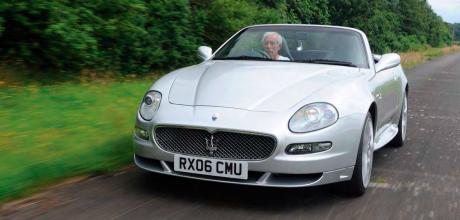2006 Maserati GranSport Spyder Tipo M138
Maserati Spyder Rare GranSport. Enigma Machine. The GranSport marked a real high point for Maserati in the new millennium. So why were only 26 drop-top GranSports ever sold in the UK? We grab a rare test drive to find out. Story by Nathan Chadwick. Images by Michael Ward.
Ultra-rare drop-top GranSport driven
Is there a better value Italian exotic on the market today than the Maserati GranSport? With a 401hp Ferrari V8 engine, genuine room for four and sensuous good looks, it represents excellent value for money for £20k and up for a nice one. Although it didn’t sell in 911-rivalling quantities, it nevertheless represented an excellent honing of the 4200 formula. That car didn’t have the easiest critical reception when it was launched but by the time the GranSport came along, Maserati had cured most of the car’s ills and added a dose of attitude to the aesthetics and performance. Given Maserati’s UK sales just a decade previous to the car’s 2004 introduction were little more than double digits, the GranSport was a success. In 2006, Maserati decided to produce a drop-top Spyder version of the GranSport – with the base materials so desirable and the droptop version of the 4200 reasonably popular, you’d expect the new car to add further invigoration to the sales figures. But it wasn’t to be – just 26 GranSport Spyders came to the UK.
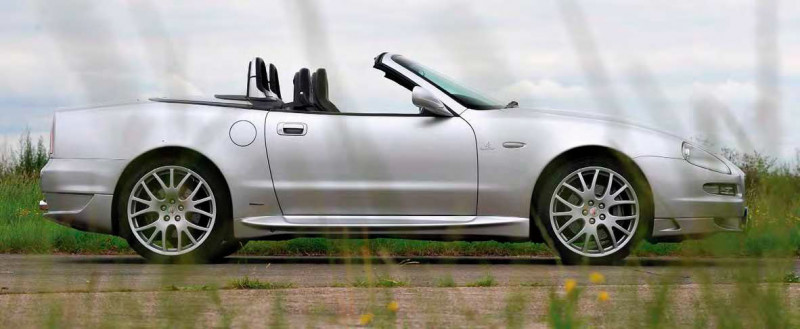
As I stand before Rex Barton’s stunning Grigio Touring example, I can’t help but wonder why. Giorgetto Giugiaro’s original 3200 design, mildly tweaked for the 4200, has always been a looker. Frank Stephenson’s additions – the deeper front splitter and ‘surfboard’ sills, primarily – were great. But not every coupe completes its topless transformation successfully. Take the Aston Martin DB7 Volante, for example – when down, the canvas hood sits on its pert rump with all the elegance of Dick Turpin’s hat. By contrast, the GranSport hides its hood well, lying under a cover behind the roll-over hoops. It’s a very elegant solution.
Removing the rear seats allows for that, of course, and this is perhaps where the GranSport Spyder ultimately fell down compared to its rivals. The 3200, 4200 and the GranSport are notable for being true four-seaters, something that very few rivals could counter. But the Spyder was a strict two-seater.
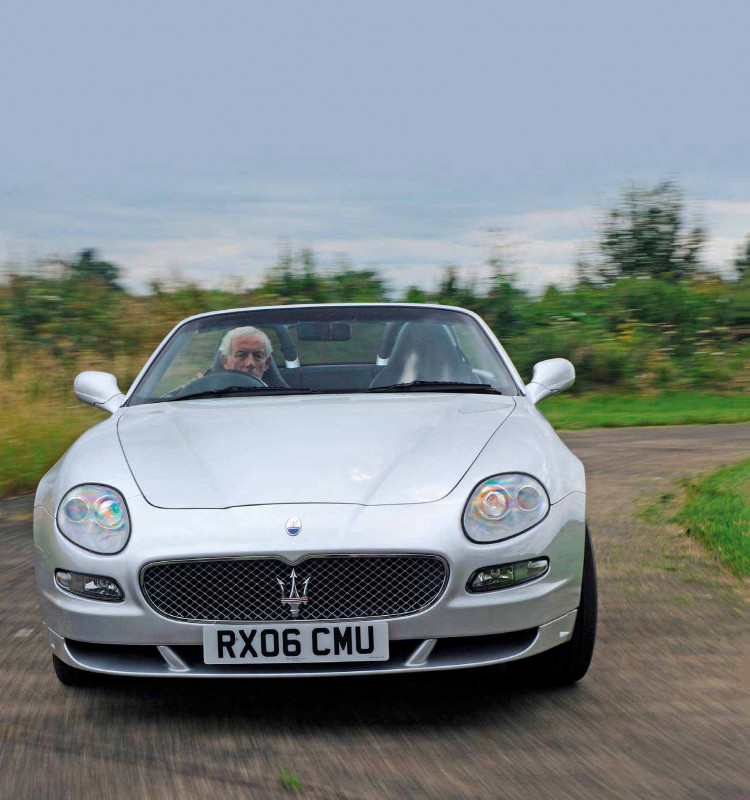
Another reason for the slow sales could be timing – the Aston Martin Vantage Volante and the Jaguar XKR Convertible were fresh-faced and new, whereas by 2006 the GranSport’s basic shape had been around for eight years, and the new GranTurismo was just a year away. Being four grand cheaper than the XKR Convertible clearly wasn’t enough to tempt any more than 26 people into Maserati dealerships.
We’re glad that the first owner of this particular example did, however. With the British summer taking a small window of opportunity to keep itself dry, the roof is very much down today. All the better to hear the 4244cc naturally aspirated Ferrari-derived F136 V8 burble into life, smooth yet bristling with intent.
The same family of engines would power the GranTurismo and Alfa Romeo 8C Competizione (with cross-plane crankshafts), while in flat-plane form it would power the Ferrari F430, California and 458 Italia. Quite a CV, that.
Pull the right-hand paddle and the six-speed Cambiocorsa semi-automatic gearbox thumps us into motion. The GranSport never received the 4200’s manual option, but this doesn’t really matter. While in the coupe there’s always the feeling of what might have been if there’d been a full complement of pedals, the droptop seems to suit what paddleshift transmissions do best – ease of use for most of the time, with the electro-mechanical engagement there if you need it for occasional off-piste naughtiness. To indulge such naughtiness requires considered picking of your moment and, more importantly, your route. The GranSport’s main criticism compared to its rivals was that its ride was far too harsh for a GT car.
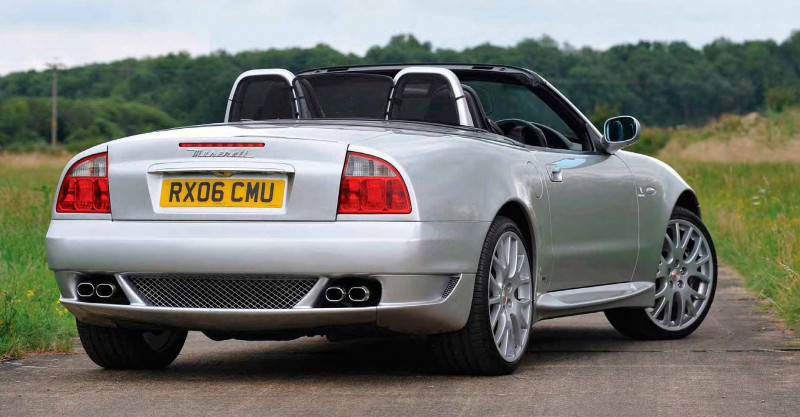
The reasons for this lie in its Ferrari-encumbered development: the GranSport was supposed to be a hardcore machine in the manner of the 360 Challenge Stradale, but Maranello saw that as too much of a threat and demanded the car be more GT-like.
Still, the GranSport’s Skyhook adaptive damping system was toughened up compared to the 4200, and ride height dropped by 10mm to provide a meaner, more aggressive experience.
The result is a car that, whether you’re in Sport mode or not, thuds and clobbers B-roads, rather than absorbs them. It helps make the GranSport a sportier and more engaging car to drive fast than its successor, the GranTurismo, especially as it is feels much smaller and nimbler. Sadly, with the roof off, it doesn’t do much for the GranSport Spyder’s torsional rigidity. Over the more corrugated sections of the nation’s highways, there’s more jiggle than a millennial rap video, the rear-view mirror oscillating to a blurriness I’ve not experienced since I ‘tested’ the full range of Martini-based cocktails.
The steering wheel writhes in my hands as I pick my way around potholes, and as you start to lean on the nose on B-roads, the steering doesn’t inspire confidence as the 50kg extra weight over the tin-top starts to make itself felt. All topless cars have problems with scuttle shake, but the GranSport Spyder feels more noticeably less tied down than the rival Aston and Jag, and even the 4200 Spyder.

An abject failure then? Absolutely not. The GranSport Spyder may never be a B-road thriller – the hardtop and MC Victory versions do that job far better – but on smooth A-roads the GranSport makes so much more sense, with only the odd expansion joint throwing a literal wobbler. At all other times it’s firm but friendly, with superb grip through the 19in rubber. You soon ease back and enjoy a fast but less frenetic driving style.
The good news continues with the steering – it might not have the greatest depth of feel through the part-carbon, part-leather wheel, but it’s sharp and accurate, making the car easy to place on flowing A-roads. Stopping power is excellent, too, thanks to Brembo four-pot callipers and 330mm front and 310mm rear discs.
The interior is a work of art that, despite having its origins in the 1990s, still manages to look fresh and exciting, courtesy of Enrico Fumia’s penwork. It’s a glorious combination of curves, leather and bluetinged carbonfibre that’s exotic to the eyes, nose and fingertips in a way that only Italian and British trimmers seem to master. This all pales into insignificance when you assess the star of the car – its engine. What starts as a smooth baritone grumble as you potter around develops into a full-blown growl as your right foot sinks further into the carpet. In Sport mode, additional exhaust valves open above 4000rpm to unleash a zinging, metallic howl as you chase the 7000rpm rev limit. Lift your right foot gently, pull the right-hand paddle and it begins again, a nerve-tingling ascent of the rev range that becomes addictive to the point of intoxicating, engineering rendered as art.
Pretty soon all thoughts of scuttle shake start to leave your mind. On a long motorway trip, the GranSport is sublime. The V8 makes all the right fruity noises when you want to be a hooligan but settles down to a refined burble when you just want to cruise. It’s also got an accessible mid-range for outside-lane overtakes, the full 333lb ft coming in at around 4500rpm.
Rex Barton, who’d only owned the car you see before you for a matter of days at the time of our shoot, is clearly enamoured with it. As a 3200 owner, he’s been a member of the Maserati Owners’ Club for 11 years, and it’s thanks to this he’s just bought this car from McGrath Maserati. “I was looking for something different and I’d seen GranSport Spyders at club events,” he says. “It’s a good touring car – reasonable boot space for a weekend away, and the drop-top is an advantage for Alpine passes. The gearbox is good for touring, too.”
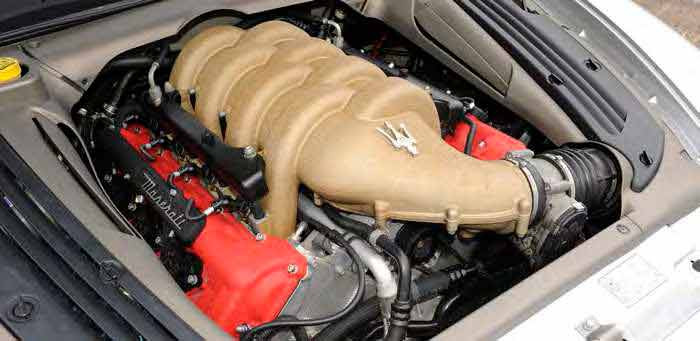
Like me, Rex is a big fan of the engine sound, especially with the roof down. Even in the short time he’s owned the car, it’s made quite an impression. “It’s a more well-rounded, easy-to-drive car than a manual 3200,” he says. “The GranSport has better weight distribution, too.”
Rex acknowledges the scuttle shake problem but hasn’t found it unreasonable and says it just takes getting used to. He’s right – jump into the GranSport Spyder on terrible roads and it’d be very easy to dismiss in the face of some very talented non-Italian rivals. Give it time, however, and the GranSport Spyder starts to get under your skin. But this is Auto Italia and I’m a marque enthusiast, so it’s time to put my journalist hat on. Through an objective lens, the GranSport Spyder has a tough battle. The Aston V8 Vantage and Porsche 911 997 have a manual option and are sportier, while the Jaguar XKR is much smoother, and all have a wider choice of spares and specialist backup. They’re all also much cheaper than the Maserati – you’re looking at £40,000 for a good GranSport Spyder, not that they come up very often.
This isn’t a rational choice – you buy a GranSport Spyder because you love it. It’s very much a heart-overhead decision, but then that’s always the way with Maserati. For all its flaws and foibles, the undiluted V8 sound soon makes you forget such trivialities. And as I type, dreaming of a long trip to Biarritz, the GranSport Spyder would make for an excellent companion.
Thanks to Rex Barton, Maserati Owners’ Club (maseraticlub.co.uk) and McGrath Maserati (mcgrathmaserati.co.uk)
TECHNICAL SPECIFICATIONS 2006 Maserati GranSport Spyder
- ENGINE: 4244cc V8 DOHC
- MAX POWER: 401bhp at 7000rpm
- MAX TORQUE: 452Nm (333lb ft) at 4500rpm
- TRANSMISSION: 6-speed semi-automatic
- WEIGHT: 1730kg
- MAX SPEED: 177mph
- 0-62MPH: 4.95sec
Swoopy, blue carbon-tinged cabin feels very special. Glorious V8 engine is a genuine highlight. Losing the roof makes scuttle shake spoil the GranSport party on anything but smooth roads.
“The GranSport Spyder may never be a B-road thriller but on smooth A-roads it makes so much more sense”


